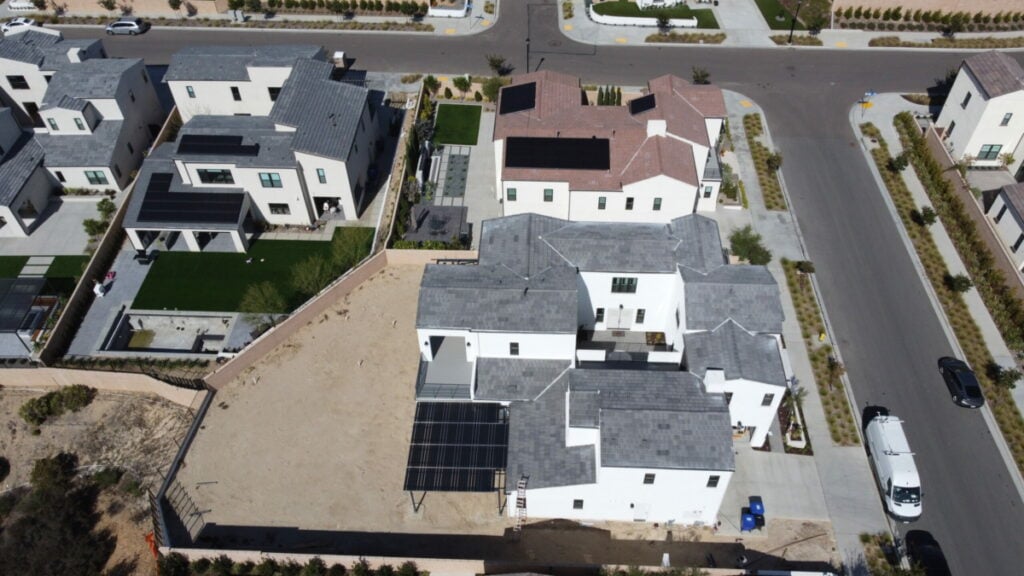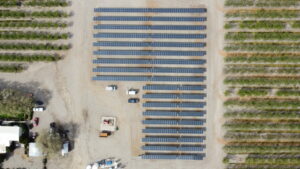The solar industry in Los Angeles is preparing for new rules from the California Public Utilities Commission (CPUC) that will slash subsidies for new solar installations.
The phones at Pasadena-based solar rooftop installer Nopec Inc. — also known as Run on Sun — are ringing constantly as customers try to beat the April 14 deadline, which is when the new CPUC rules take effect.
“For many people, this will make a very drastic change overnight to the value of projects,” said Jim Jenal, chief executive of Run on Sun.
The rules will impact California’s three investor-owned utilities: Southern California Edison, San Diego Gas and Electric and Pacific Gas and Electric. The changes apply only to customers who install solar after April 14.
However, the rules could still have a significant impact on Los Angeles, as Southern California Edison has 2.05 million customers in the county, and 134,855 of them have rooftop or on-site solar power systems.
New rules
The rules are an update to the Net Energy Metering 2.0 system, which determines the credit given to rooftop solar customers for the power they send back to the grid. The new rules, NEM 3.0, will reduce the compensation rate for ratepayers who install solar power systems from an average of 30 cents per kilowatt to 8 cents, a nearly 75% reduction, according to the California Solar & Storage Association.
“Whereas you might have someone who installs a 6- or 7-kilowatt system and has a payback in five to seven years, they’ll see that go to 14 years or more,” Jenal said.
NEM 3.0 also includes $900 million in incentives for pairing solar with battery storage systems and $630 million to encourage low-income customers to install solar and battery storage. The CPUC expects that an average residential customer with a solar and battery storage system will save at least $136 a month and fully pay off their system within nine years.
CPUC anticipates a bump in installations prior to the April 14 sunset of NEM 2.0, and a dip immediately afterwards. In the long term, however, CPUC anticipates that NEM 3.0 will lead “to sustainable growth of distributed generation,” a spokesperson said.
Last year, Californians installed about 140,000 solar systems, but battery installations may be delayed due to supply chain issues and strict building codes, according to Brad Heavner, policy director at the California Solar & Storage Association.
“There needs to be a transition to get the products available in California,” Heavner said. “Get local governments up to speed on doing the permit approvals and everything else in the chain.”
While NEM 3.0 presents a challenge, the new rules could ultimately relieve the strained grid if more people install batteries, according to Hans Rosenberger, president of Altadena Energy & Solar.
The Inflation Reduction Act also extended the solar investment tax credit for 10 years. The credit covers up to 30% of the costs of installing rooftop solar and battery storage, which will help solar development, Rosenberger said.
“The new (CPUC) rules are challenging from an economic perspective, but I think many people install solar because of their belief in sustainability,” Rosenberger said. “I think people still want to do that even if the CPUC makes it more economically challenging.”
Altadena Energy & Solar Inc.
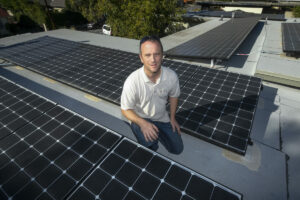
Headquarters: Pasadena
Business: Solar energy and energy storage system developer
CEO: Hans Rosenberger. Company is co-owned with Joy Lam.
Employees: 13
Sales: About $3-4 million in sales a year
Year Founded: 2008
When Hans Rosenberger launched his company in 2008, the world was entering the largest recession since the 1930s and the solar industry had yet to enter the mainstream.
To overcome those challenges, Rosenberger relied on equity investment from friends and family. He also focused on thermal systems and found clients, mainly environmentalists and engineers, who wanted to incorporate solar thermal and panel systems into their homes. Over time, his company has become bankable.
Since its launch, Altadena Solar’s client pool has grown alongside the utility scale solar industry. The industry is also not as niche anymore, Rosenberger said.
“Today, we know that our civilization depends on us implementing renewable power broadly across the globe in years and decades,” Rosenberger said.
He added that California residential and commercial system capacity grew by close to 2 gigawatts last year, enough to power roughly 1.4 million homes.
“It is a much changed world,” Rosenberger said.
Despite increased demand for solar, businesses face a different set of challenges today compared to when Altadena Solar was launched. Funding can be an issue as banks are risk averse and the new CPUC rules will make it more difficult to show financial value to customers, according to Rosenberger.
Energy storage will be key for solar companies to continue to stay competitive, he added.
“Energy storage in its many forms is our most challenging design element and holds the most promise for helping us to continue to install the PV modules and to balance the energy needs of the state’s electricity grid,” Rosenberger said. “Incorporating them economically and effectively into our systems will be key to doing well in the coming decade.”
Rosenberger, who runs the company with his partner, Joy Lam, believes that Altadena Solar’s success stems from the employees’ belief in the renewable energy mission.
He strives to run a company that excels in its projects through design, implementation and customer service.
“I don’t strive to be the biggest, but to excel at our scale in our local market is what I find exciting,” Rosenberger said. “Likewise, I want our company to provide a good employment opportunity for all our employees in their roles with challenging but rewarding work, and good compensation and benefits. It is important to me that they do well and gives longevity to our collective work.”
Nopec Inc. dba Run on Sun
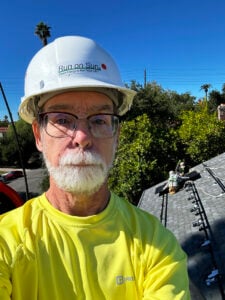
Headquarters: Pasadena
Business: Solar and storage installation and repair company
CEO: Jim Jenal
Employees: 4
Revenue (2022): $536,000
Notable: Jenal said that every project coordinator he has hired was a woman.
When Jim Jenal, a lawyer at the time, decided to install a solar-energy sytem at his home, he found the lack of technical knowledge in the solar industry shocking.
“When pressed on technical details, they really didn’t have coherent answers – one of them even said, ‘you know, volts, amps, it’s all the same thing,’ not a very satisfying answer,” Jenal said.
He wanted to create a solar company that charged a bit more but had the technical expertise his competitors lacked. Based on those principles, Jenal founded Run on Sun in September 2006. It carried out its first installation in 2007. The company’s expertise has enabled it to become an authoritative source on anything solar, which has helped it grow.
“In 2009 I started writing my blog, “Thoughts on Solar,” and that really helped us establish ourselves as an authoritative source for solid information about the solar industry,” Jenal said. “I like to say that at Run on Sun we punch above our weight, because despite being a small company we have a much larger sphere of influence, and that is directly attributable to our blog.”
The biggest change in the solar industry since the inception of Run on Sun has been the drop in prices. Solar is more affordable than ever and people with lesser means have more access. On top of that, technology has improved greatly, Jenal said.
“When we started, the solar panels we were installing were 190 watts each. Today they are 400 watts in nearly the same footprint,” he added. “We now have microinverters that are much more reliable than the string inverters they’ve replaced, and battery storage is becoming commonplace, though those prices are still high. But in the coming years, storage will become more affordable as the economies of scale kick in.”
Over the next few years, Jenal hopes to double the company’s business and crack the million-dollar mark.
“I want to continue to underpromise and overdeliver to our clients,” Jenal said.
AWS Solar
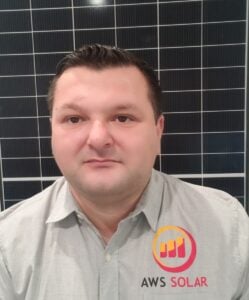
Headquarters: Sun Valley
Business: Solar and battery installation company
CEO: Frank Muntean
Year Founded: 2007
Employees: 12
Revenue (2022): $6 million
Notable: The company has had more than 4,000 customers.
AWS Solar is on a mission is to help clients reduce dependence on fossil fuel and protect the environment, but also to help people understand how solar can help them financially.
When the company launched in 2007, it focused on educating its customers on how solar can save customers’ money. With new technology, this mission has become easier, because systems are getting smarter, allowing customers to see and monitor production and consumption in real time, according to Frank Muntean, the company’s chief executive.
“Solar will be able to charge an electric car in a daytime and use the car battery in the nighttime or at the peak time to power the home. Battery storage is becoming more available and easier to use,” Muntean said.
He added that technology has also enabled customers to generate more energy with fewer panels.
Muntean predicts that the new CPUC rules will have a negative effect on the growth of solar in California. With the new rates, lower- and middle-income people will be hurt the most, he argued.
“That being said, there are still creative financing solutions that make going solar a better deal than just staying with any of the three public utilities, as those utilities appear to use the CPUC and their monopolies to increase energy rates at every turn,” Muntean said.
It will still pay off to install solar, he said.
“Even under NEM 3.0, after a few years you will have paid back the investment and will be generating energy at a fixed cost per kilowatt hour, avoiding the ever-higher rates offered by the utility.”
American Solar Power
Headquarters: Cypress Park
CEO: Edwin Baranian
Business: Installs solar panels for commercial and residential customers.
Employees: 10
Notable: American Solar Power Inc. has been a family-owned and operated
business since it opened in September 2009.
As solar technology evolves, staying up to date can be challenging, but American Solar Power’s chief executive, Edwin Baranian, is hopeful about the future.
“Batteries are becoming a larger part of the business and certainly add some excitement,” Baranian said. “I think as costs come down we will see them implemented more and more. I think microgrids and how we will interface with the grid going forward is another great thing to look forward to.”
Since the family-run business launched in 2009, the industry has seen improved technology, lower prices, and increased product availability.
“One change that has benefited us the most was the commercial solar market has boomed and shown to be more profitable than the residential market for the solar installer,” Baranian said.
He said that the commercial market is also likely to alleviate the blowback from the new CPUC rules.
“Solar is already cheaper than the alternatives, and that will just get better over time,” he said. “It just makes sense for heavy users, as you see in the commercial market, to control their costs long term.”
While the new regulations pose a challenge, solar has already proven itself in the marketplace, and the industry is not grappling with recognition anymore, a challenge American Solar faced when the company launched.
“There was a lack of experienced field crew,” Baranian said. “The public in general was not familiar with solar as well. We made some great hiring decisions and trained and treated employees well to maintain them. We also focused on educating clients about solar prior to sales by showing them clear financial results to help them make a decision.”
As for the future, Baranian will strive to share the experience and knowledge that the company has gained to help others succeed.
“That may see us expanding to other states,” Baranian said. “We feel there is an opportunity to help other communities begin to utilize solar power more than they are today by providing high-quality installations done with master craftsmanship.”
